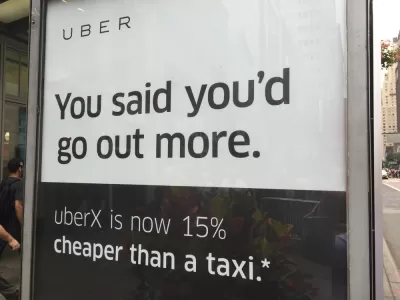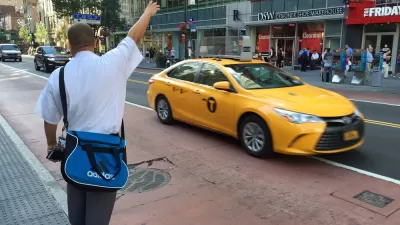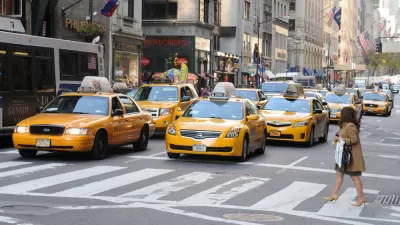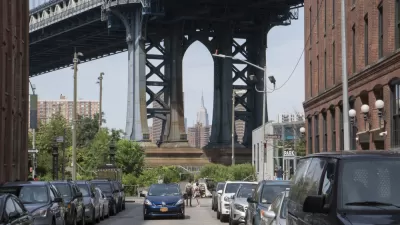To support the taxi industry and reduce congestion, the New York City Council could cap the number of ride-hailing vehicles operating in the city. The cap could be a first major step toward a new era of transportation regulation.

"New York City officials are moving to cap the number of vehicles driving for Uber and other ride-hailing services as part of an aggressive move to address mounting concerns that their explosive growth has led to worsening congestion and low driver wages," reports Emma G. Fitzsimmons.
If the proposed legislation is approved by the New York City Council, it would be the first city in the United States to set a limit on ride-hailing vehicles, according to Fitzsimmons. "Mayor Bill de Blasio, while stopping short of fully endorsing the proposal, suggested that the time had come to rein in the industry," but the mayor also supported a cap, which eventually failed, in 2015. City Council Speaker Corey Johnson proposed the current cap.
Fitzsimmons presents the news of the proposed cap on the number of ride-hailing vehicles in context of the rapid transformation that transportation network companies have had on transportation. That transformation had had significant consequences—for the taxi industry, for congestion, and on the infiltration of mobile app technology into every aspect of daily life.
Andrew J. Hawkins provides coverage of the story for The Verge, and Reuters also reported the news, reflecting the importance of the development for New York, but also for the ongoing, big questions about how cities will regulate transportation in an era of innovation that already includes dockless bikes and electric scooters, and could one day could also include self-driving cars. So far, some cities have proven willing to regulate the number of dockless bikes and to regulate the use of electric scooters, but transportation network companies and companies testing autonomous vehicles have leveraged their industry might (or their popularity with the public) to avoid significant regulation.
FULL STORY: New York Could Become First Major U.S. City to Cap Uber and Similar Vehicles

Alabama: Trump Terminates Settlements for Black Communities Harmed By Raw Sewage
Trump deemed the landmark civil rights agreement “illegal DEI and environmental justice policy.”

Study: Maui’s Plan to Convert Vacation Rentals to Long-Term Housing Could Cause Nearly $1 Billion Economic Loss
The plan would reduce visitor accommodation by 25% resulting in 1,900 jobs lost.

Planetizen Federal Action Tracker
A weekly monitor of how Trump’s orders and actions are impacting planners and planning in America.

Grand Rapids Mayor Proposes Garage Conversion Plan
The mayor says allowing homeowners to convert garages to dwelling units could alleviate the city’s housing shortage.

Baltimore Ordered to Improve Sidewalk Accessibility
The city is one of many to face lawsuits for failing to comply with the Americans with Disabilities Act.

This Toronto Suburb Has More Bus Riders Than Columbus, Ohio
Brampton, Ontario used gradual improvements in service to prove that if you build it, they will ride.
Urban Design for Planners 1: Software Tools
This six-course series explores essential urban design concepts using open source software and equips planners with the tools they need to participate fully in the urban design process.
Planning for Universal Design
Learn the tools for implementing Universal Design in planning regulations.
Smith Gee Studio
Alamo Area Metropolitan Planning Organization
City of Santa Clarita
Institute for Housing and Urban Development Studies (IHS)
City of Grandview
Harvard GSD Executive Education
Toledo-Lucas County Plan Commissions
Salt Lake City
NYU Wagner Graduate School of Public Service





























